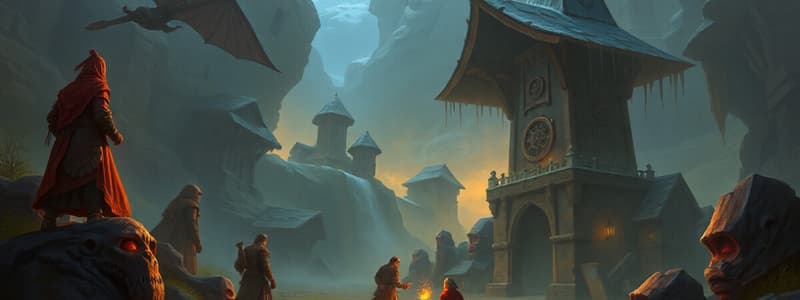Podcast
Questions and Answers
What is the primary role of the Dungeon Master in Dungeons and Dragons?
What is the primary role of the Dungeon Master in Dungeons and Dragons?
Which of the following is not an example of a character attribute in Dungeons and Dragons?
Which of the following is not an example of a character attribute in Dungeons and Dragons?
What is the term used for the process of players gaining experience points and improving their abilities?
What is the term used for the process of players gaining experience points and improving their abilities?
In Dungeons and Dragons, players typically control characters belonging to which types?
In Dungeons and Dragons, players typically control characters belonging to which types?
Signup and view all the answers
Which of the following editions is the current version of Dungeons and Dragons as of 2023?
Which of the following editions is the current version of Dungeons and Dragons as of 2023?
Signup and view all the answers
Which aspect of Dungeons and Dragons emphasizes teamwork and collaborative storytelling?
Which aspect of Dungeons and Dragons emphasizes teamwork and collaborative storytelling?
Signup and view all the answers
What types of dice are mainly used in Dungeons and Dragons gameplay?
What types of dice are mainly used in Dungeons and Dragons gameplay?
Signup and view all the answers
What provides an online resource for character management and rules in Dungeons and Dragons?
What provides an online resource for character management and rules in Dungeons and Dragons?
Signup and view all the answers
Study Notes
Overview of Dungeons and Dragons (D&D)
- Type: Tabletop role-playing game (RPG).
- Created by: Gary Gygax and Dave Arneson.
- First Published: 1974; evolved through various editions.
Gameplay Elements
- Players: Typically 3-6, including at least one Dungeon Master (DM).
-
Character Creation:
- Players create characters with specific races (e.g., elves, dwarves) and classes (e.g., fighter, wizard).
- Character attributes include Strength, Dexterity, Constitution, Intelligence, Wisdom, and Charisma.
- Dice: Mainly uses polyhedral dice (D4, D6, D8, D10, D12, D20) for determining outcomes.
Roles
-
Dungeon Master (DM):
- Responsible for world-building, story development, and guiding the players.
- Controls non-player characters (NPCs) and manages encounters.
-
Players:
- Control their characters and interact with the game world.
- Make decisions impacting the storyline and character development.
Core Mechanics
- Turn-based Combat: Players take turns performing actions like attacking, casting spells, or using items.
- Skill Checks: Players roll dice to determine success in various activities (e.g., sneaking, persuasion).
- Leveling Up: Characters gain experience points (XP) and level up, increasing their abilities and unlocking new skills.
Setting and Lore
- Campaign Settings: D&D can be set in various worlds (e.g., Forgotten Realms, Eberron) with unique lore and rules.
- Magic System: Incorporates spells, magical items, and artifacts that characters can use.
- Adventuring: Characters undertake quests, explore dungeons, and interact with the game world.
Editions
- Current Edition: 5th Edition (released in 2014).
- Previous Editions: Each has introduced new rules, gameplay mechanics, and updated lore.
Community and Culture
- D&D Beyond: Online resource for rules, digital tools, and character management.
- Media Influence: Adaptations in movies, novels, and TV shows; has garnered a cult following.
- Conventions: Events and tournaments, e.g., Gen Con, where fans participate in live sessions.
Key Themes
- Cooperation: Emphasis on teamwork and collaborative storytelling.
- Imagination: Encourages creativity within character development and storytelling.
- Fantasy Exploration: Immersion in fantastical settings and adventures.
Dungeons and Dragons Overview
- A tabletop role-playing game (RPG) created by Gary Gygax and Dave Arneson in 1974.
- It has evolved through various editions, with the current version being the 5th Edition, released in 2014.
Gameplay
- Typically involves 3-6 players, including a Dungeon Master (DM).
- Players create characters with specific races (like elves and dwarves) and classes (like fighters and wizards).
- Each character has attributes such as Strength, Dexterity, Constitution, Intelligence, Wisdom, and Charisma.
- Players use polyhedral dice (D4, D6, D8, D10, D12, D20) to determine outcomes.
Roles
- The DM is responsible for world-building, story development, and guiding the players.
- The DM controls non-player characters (NPCs) and manages encounters.
- Players control their characters, make decisions that impact the storyline, and drive character development.
Core Mechanics
- Combat is turn-based, where players perform actions like attacking, casting spells, or using items.
- Players roll dice to determine success in various activities, like sneaking or persuasion, which are called Skill Checks.
- Characters gain experience points (XP), level up, and increase their abilities, gaining new skills.
Setting and Lore
- D&D can be set in various worlds, called campaign settings.
- Popular campaign settings include: Forgotten Realms and Eberron.
- Each setting has its own unique lore and specific rules.
- Features a magic system that incorporates spells, magical items, and artifacts that characters can use.
- Characters embark on quests, explore dungeons, and interact with the game world.
Community and Culture
- D&D Beyond is an online platform that provides rulebooks, digital tools, and character management features.
- D&D has inspired adaptations in movies, novels, and television shows, leading to a devoted fan base.
- Conventions like Gen Con host live D&D sessions and tournaments.
Key Themes
- Emphasizes cooperation, teamwork, and collaborative storytelling.
- Encourages imagination and creativity in character development and storytelling.
- Focuses on exploring fantastical settings and adventures.
Studying That Suits You
Use AI to generate personalized quizzes and flashcards to suit your learning preferences.
Description
This quiz covers the fundamentals of Dungeons and Dragons (D&D), including its history, gameplay elements, and character creation processes. Test your knowledge on the roles of players and Dungeon Masters, and how the mechanics come together in this iconic tabletop RPG.




